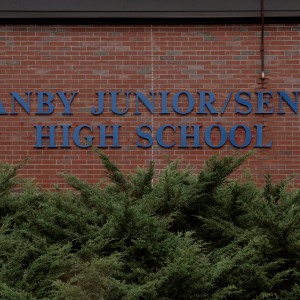Amherst Regional school board contesting town’s spending cap

Amherst Regional Middle School. STAFF FILE PHOTO
| Published: 01-31-2025 1:01 PM |
AMHERST — A letter being drafted by members of the Amherst-Pelham Regional School Committee to the Amherst Town Council is challenging the idea that the school officials’ annual budget requests have been fiscally irresponsible, while at the same time seeking ways to gain more financial support in the face of up to 24 staff reductions projected for next year.
As a response to both a Town Council letter sent to the School Committee in June and a December memo providing fiscal year 2026 guidelines, which asks the regional schools to project 3-4% budget increases annually through fiscal year 2029, the draft letter pushes back on the narrative that the schools have not been prudent in budgeting, Amherst representative Bridget Hynes said.
“What we want to show is there are different historical trends there, including the fact that the amount the district gets overall as percentage of the town budget has gone down,” said Hynes, who is also a member of the committee’s three-person Financial Sustainability Subcommittee that is drafting the letter.
The discussion came in advance of the next “four towns” meeting, set for the morning of Feb. 8, that will bring together elected and appointed officials from Amherst, Pelham, Leverett and Shutesbury. That meeting, following ones held at the middle school library in September and December, is expected to provide more details about the $37.7 million level services budget being sought for the middle and high schools, where students from the four towns are educated, and the methods for apportioning assessments to each community.
Amherst representative Jennifer Shiao, who heads the subcommittee, said the council’s request to project annual spending plans out to fiscal year 2029, and to assume 3-4% increases when other cities and towns are projecting 6-8% increases in their budgets, isn’t realistic.
“We felt that that was an unreasonable request,” Shiao said.
But there are several other aspects of the draft letter, including concerns that the district’s decision-making process is being undermined by allowing the largest town to take precedence over the others in preparing the budget.
The letter argues that having the Town Council dictate the amount of any budget increase undermines the cooperation needed to have three of the four towns agree on a spending plan, and “is a practice that could financially devastate the regional schools if practiced by each town.”
Article continues after...
Yesterday's Most Read Articles
 Long-vacant former Faces spot in Northampton gets new tenant
Long-vacant former Faces spot in Northampton gets new tenant
 Here come the sweetness: Four new businesses prepping to open in downtown Northampton
Here come the sweetness: Four new businesses prepping to open in downtown Northampton
 Local ‘Hands Off!’ standouts planned as part of national effort
Local ‘Hands Off!’ standouts planned as part of national effort
 Area property deed transfers, April 4
Area property deed transfers, April 4
 Hatfield Select Board removes elected Housing Authority member
Hatfield Select Board removes elected Housing Authority member
 Shutesbury reviewing how to improve safety on Lake Wyola in wake of accident last summer
Shutesbury reviewing how to improve safety on Lake Wyola in wake of accident last summer
The subcommittee is also concerned about restricting the future capital budget so dramatically as to “avoid taking on new initiatives unless a source of revenue is identified to maintain the initiative in future years,” and that “planning an annual 5% surplus (for Amherst); we believe that is too high and results in operating budgets that require cuts.”
The draft letter cites Amherst’s per-pupil spending as being higher than Northampton’s because that city’s school budget doesn’t pay for staff benefits, retirement, human resources or information technology. Instead, that is paid for through the municipal budget.
The Regional School Committee’s requests include that the Town Council lower its targeted surplus, dropping it from 5% to 4% and ensuring approximately $1 million more for available operating budgets; allocating an additional annual amount equivalent to the 11.7% increase for the retirement costs in the school budget; and recognizing the need to contribute additional funds allocated “toward the school district’s disproportionate need to attend to gaps in equity.”
Hynes said the School Committee’s underlying objection is that the Amherst Town Council has been putting forward a predetermined way to deal with the school budget that starts with economics, rather than the educational needs of students and teachers.
“We wanted to just respond to that so we have some ability to shape the discussion in Amherst, and this committee needs to do that, I think,” Hynes said.
Deborah Leonard, an Amherst representatives and also on the subcommittee, said there is frustration over the inability to regularly speak with the Town Council in the lead-up to creating a budget.
“There is no conversation about our budget,” Leonard said.






 A father’s dream to be the best: Twelve men graduate from Nurturing Fathers program
A father’s dream to be the best: Twelve men graduate from Nurturing Fathers program McGovern co-sponsors bill that aims to stop ‘backdoor’ cuts to SNAP benefits
McGovern co-sponsors bill that aims to stop ‘backdoor’ cuts to SNAP benefits Final interviews set for Granby school superintendent candidates
Final interviews set for Granby school superintendent candidates
